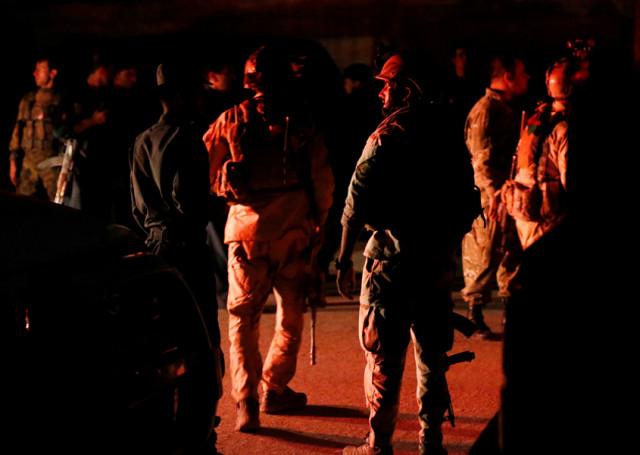University attack exposes weak security institutions
Kabul remains vulnerable as ever as top leaders engage in power struggle

Last month, IS bombers brutally killed nearly 80 Hazara protesters in Kabul when most security personnel and police were deployed to protect the presidential palace and the office of the chief executive. PHOTO: REUTERS
Those who committed this heinous crime in the Afghan capital on Wednesday are mysteriously silent and no group has yet claimed responsibility. However, the style of the attack on the American University of Afghanistan in Kabul is nothing new and many Afghans have already pinned responsibility.
Certain groups will be seen as the culprits until they publicly distance themselves from the attack.
The impact was felt on this side of the border and, in a show of cooperation, Pakistani forces acted quickly on a tip-off provided by the Afghan officials.
ISPR says the Pakistan Army “carried out a combing operation in an area closer to the Pak-Afghan border to verify the presence of miscreants. This was based on the three Afghan cell numbers provided by authorities in Kabul”.
Over a phone conversation, Chief of Army Staff General Raheel Sharif told Afghan President Ashraf Ghani that all SIMs used during the attack were from a “network owned and operated by an Afghan company and its signals spill over to some bordering areas.”
Although no side has reported any progress on finding the masterminds of the attack, Pakistan’s immediate response was that it is a must to target the suspects.
The army chief assured the Afghan president of complete cooperation on any further information from Kabul.
The terrorists may have attacked the university because of the “American” in its name, but the institute is as local as they come.
Afghan educationists say there is no justification for the attack, even if the institute has an American label. All the students and majority of the teachers are Afghans and the pupils pay the fee from their own pockets.
Zahid Jalali, an Afghan educationist and writer, argues there is no justification for attacks on educational institutions.
“All the students and teachers are Afghans. Even those who disagree with the US policies study at the university,” Jalali told The Express Tribune on Friday. He said there is no difference between students who study at the American University and those of Kabul University.
The assault on August 24 once again exposed fragile security arrangements in the Afghan capital. The attack came at a time when the Taliban also increased their attacks in the north, south and eastern parts of the country.
On my last visit to Kabul in March, I noted that almost every building is heavily guarded and secured. It is difficult for people to gain access unless they cross several barriers and tough security checks.
However, the gunmen entered the American University and fought with security personnel for nearly ten hours.
Authorities should have increased security after gunmen kidnapped an Australian and an American teacher of the university on August 8. An Indian aid worker, Judith D’Souza, was abducted in Kabul in June and was later released.
Afghan leaders, who are involved in their own political squabble, will have to review the weaknesses in Kabul’s security arrangements.
It is also widely believed that militants enjoy some support from the security establishment and this has helped them sneak into sensitive and secure buildings.
While Afghans still are in shock over the university attack, President Ghani and Chief Executive Dr Abdullah Abdullah are involved in a power struggle and have failed to reach an understanding at their second meeting in Kabul on Thursday.
A section of the Afghan media is critical over the failure of security bodies to prevent attacks in Kabul and said its institutions were not paying attention to the issue at hand.
Private Afghan newspaper Arman-e-Melli believes the violence has created serious problems for Kabul residents.
“Nowadays, Kabul residents are critical over the performance of security institutions in the capital city and are questioning why they do not have a precise strategy to thwart such incidents which disturb the peace and security in the city,” stated a piece published in the paper this week.
The attack on the university was the second brazen attack in five months.
The Taliban attacked one of the most secure security offices in Kabul on April 19 and killed 64 people and injured over 350 others.
Last month, IS bombers brutally killed nearly 80 Hazara protesters in Kabul when most security personnel and police were deployed to protect the presidential palace and the office of the chief executive.
Published in The Express Tribune, August 27th, 2016.



















COMMENTS
Comments are moderated and generally will be posted if they are on-topic and not abusive.
For more information, please see our Comments FAQ